Abstract
1. The classification of tachykinin receptors in the guinea-pig trachea has been investigated. This was of interest because, from previous studies, it was not clear whether the guinea-pig trachea contains either a mixture of NK1 and NK2 receptors or, alternatively, a single type of novel tachykinin receptor. 2. In the present study, the guinea-pig trachea was contracted by tachykinin agonists selective for NK1 receptors (substance P methylester (SPOMe) and GR73632) or NK2 receptors (GR64349) but not NK3 receptors (senktide). 3. Against SPOMe and GR73632, the NK1 antagonist, GR71251, behaved as a reversible competitive antagonist having apparent affinity (pKB 7.05 vs SPOMe) consistent with action at NK1 receptors. GR71251 (3 microM) did not antagonize responses to GR64349. 4. The NK2 antagonists L-659,877 and Ac-Leu-Asp-Gln-Trp-Phe-Gly-NH2 (R396) antagonized GR64349 although only R396 appeared to behave competitively (pKB 5.73). Neither L-659,877 (30 microM) nor R396 (30 microM) blocked responses to SPOMe. 5. For L-659,877 and R396, comparison was made between activity in guinea-pig trachea and in preparations known to contain tachykinin receptors predominantly of the NK2 type. In the rabbit trachea, both L-659,877 and R396 had effects similar to those in guinea-pig trachea. In contrast, in the rat colon muscularis mucosae, both L-659,877 and R396 appeared to behave competitively with pKB values against GR64349 of 7.83 and 6.90 respectively. 6. It is concluded that in guinea-pig trachea, contractile responses can be induced by activation of both NK1 and NK2 receptors. The present data are discussed with reference to the proposed existence of subtypes of the NK2 receptor.
Full text
PDF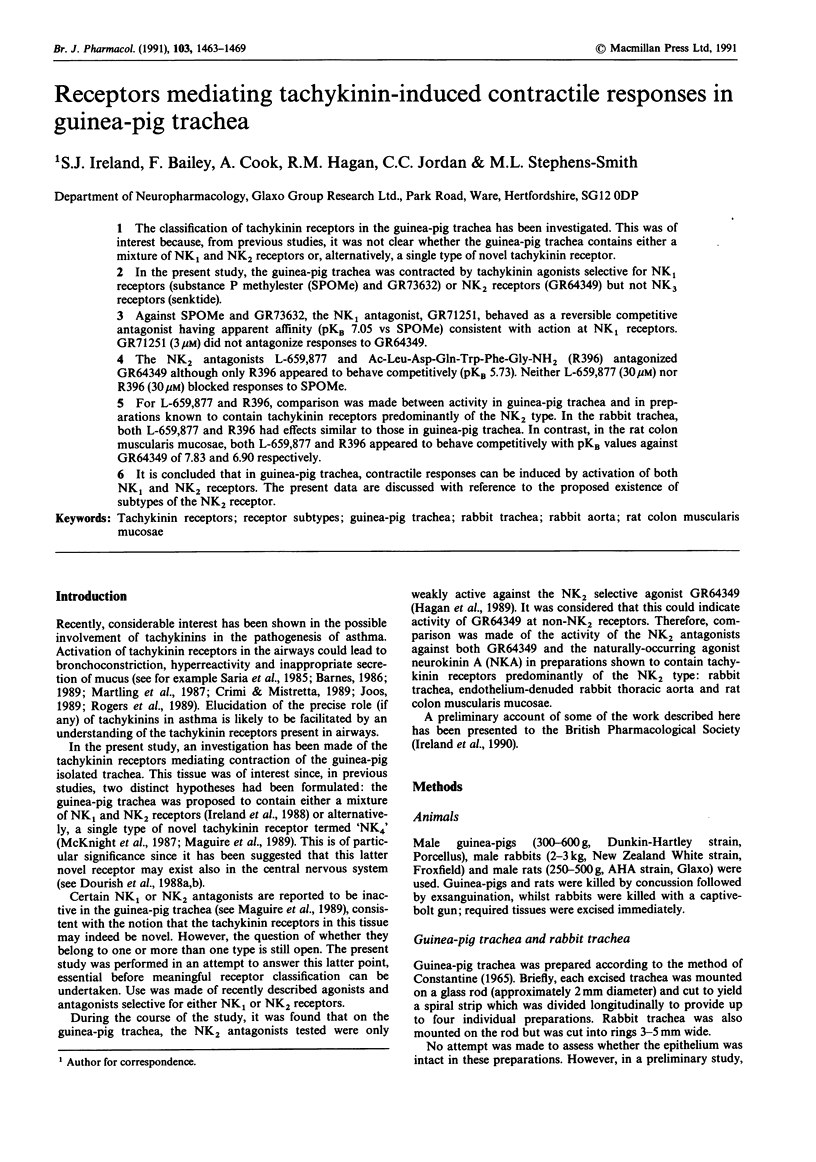
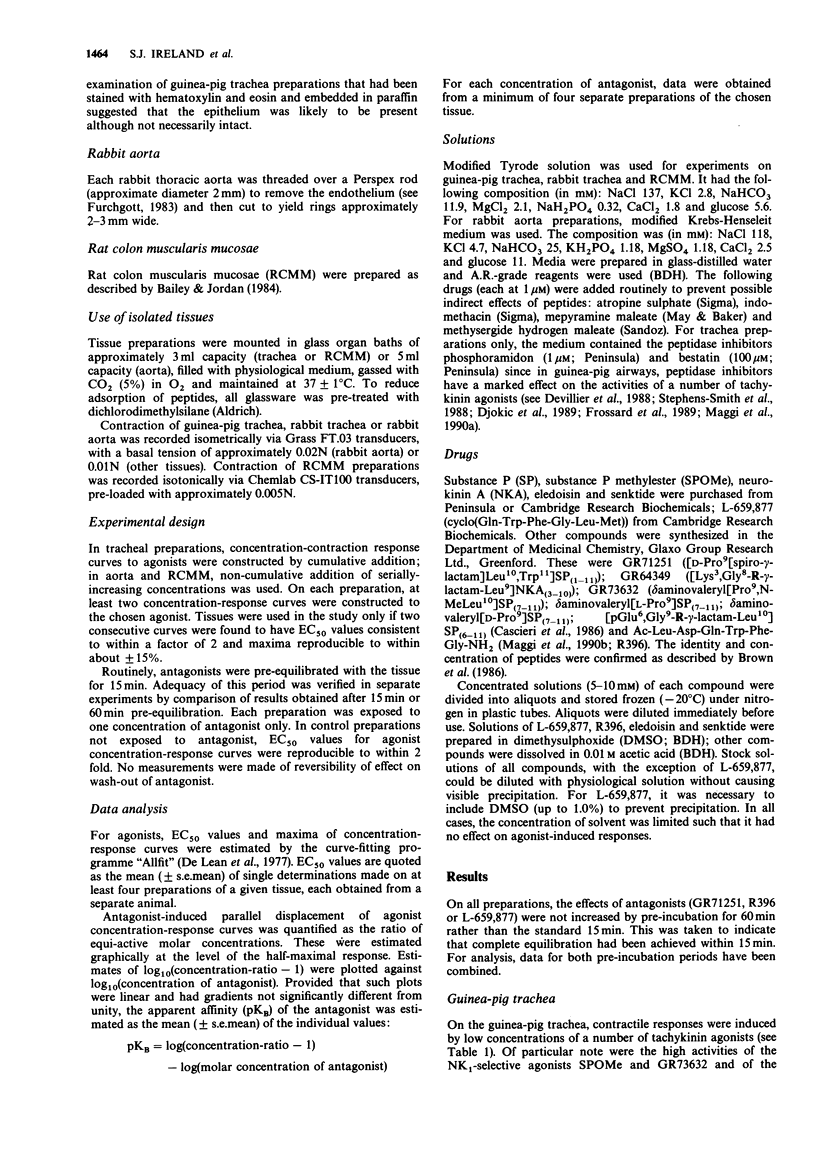
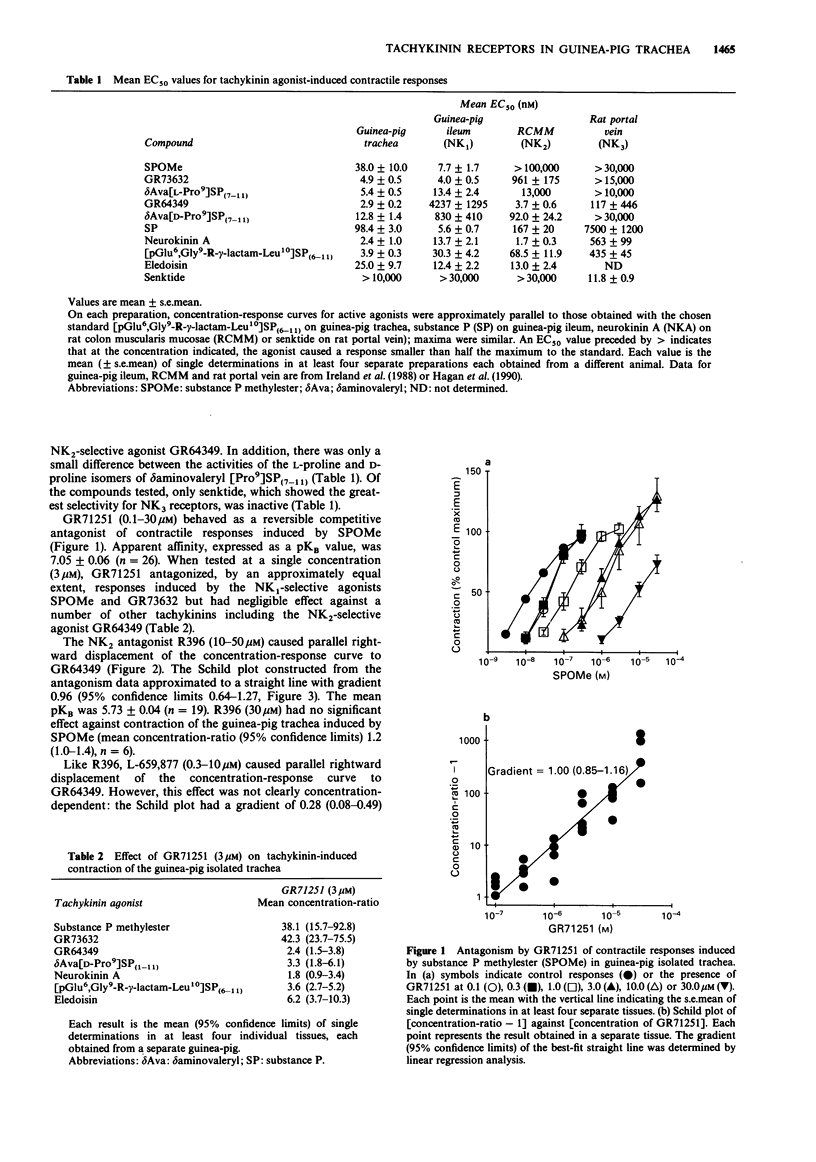
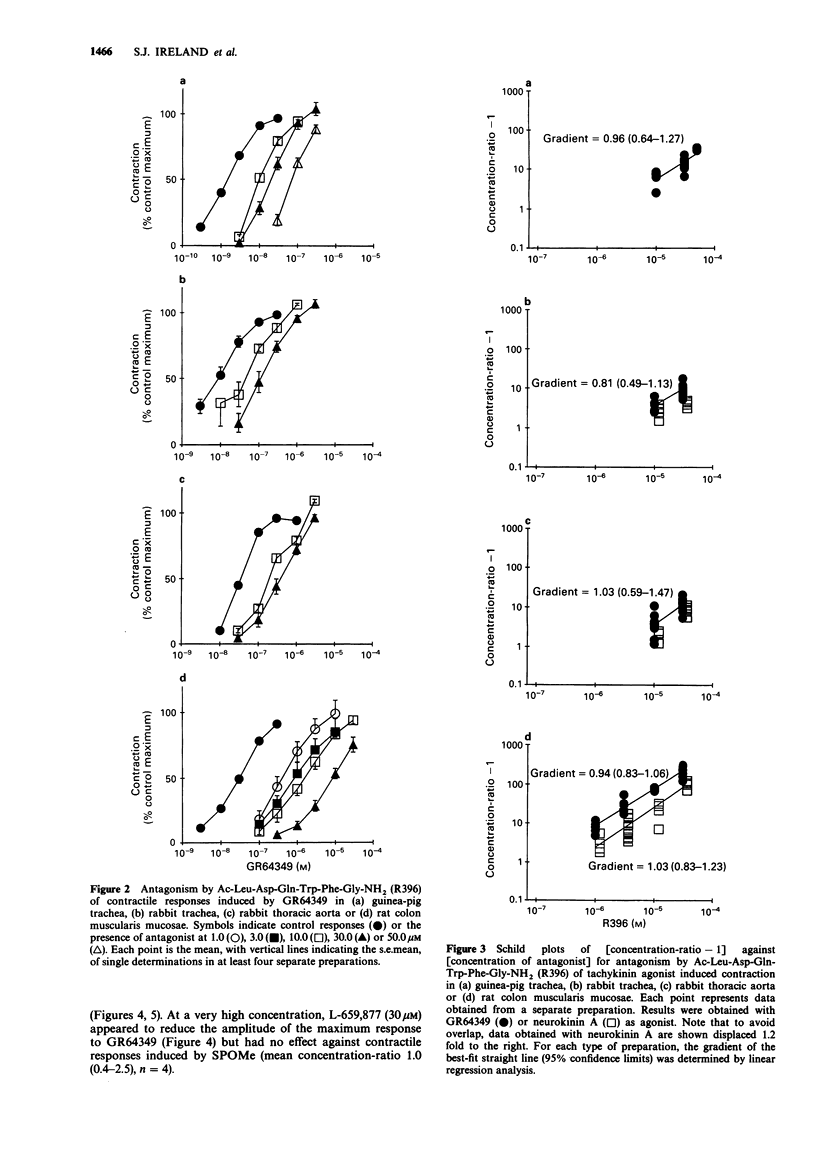
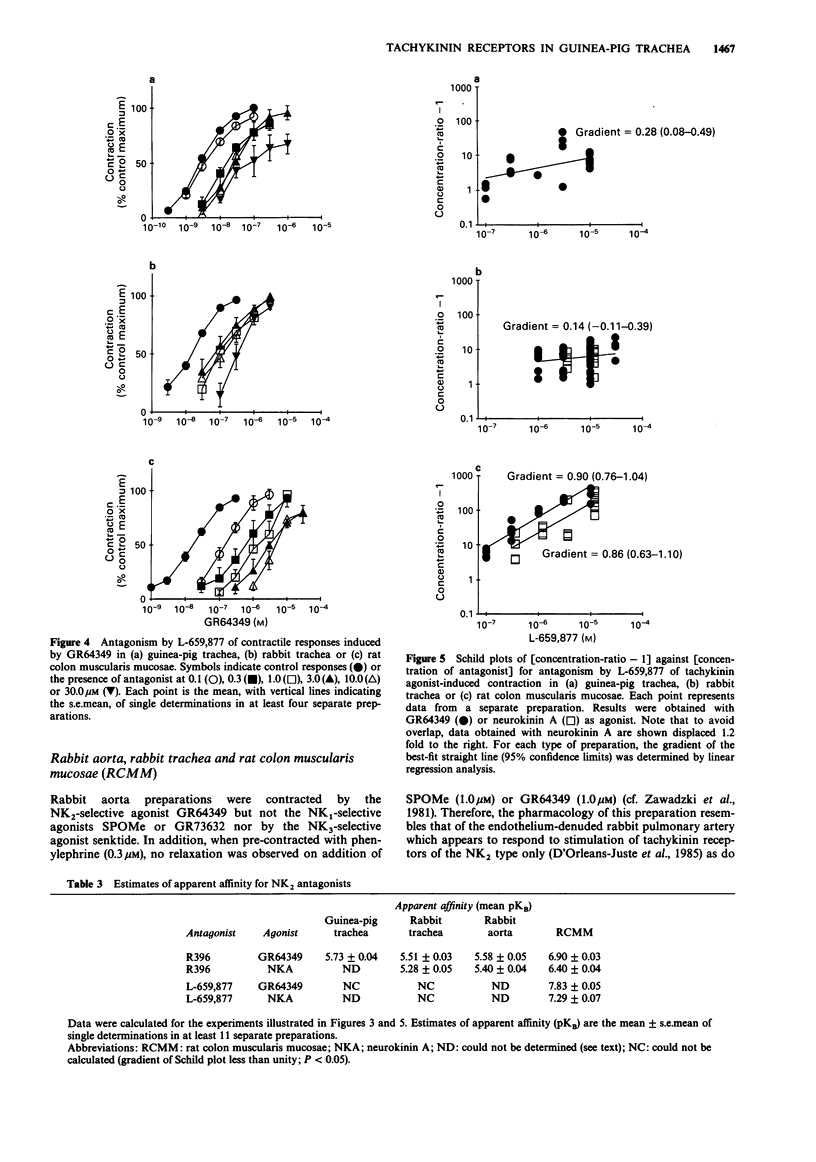
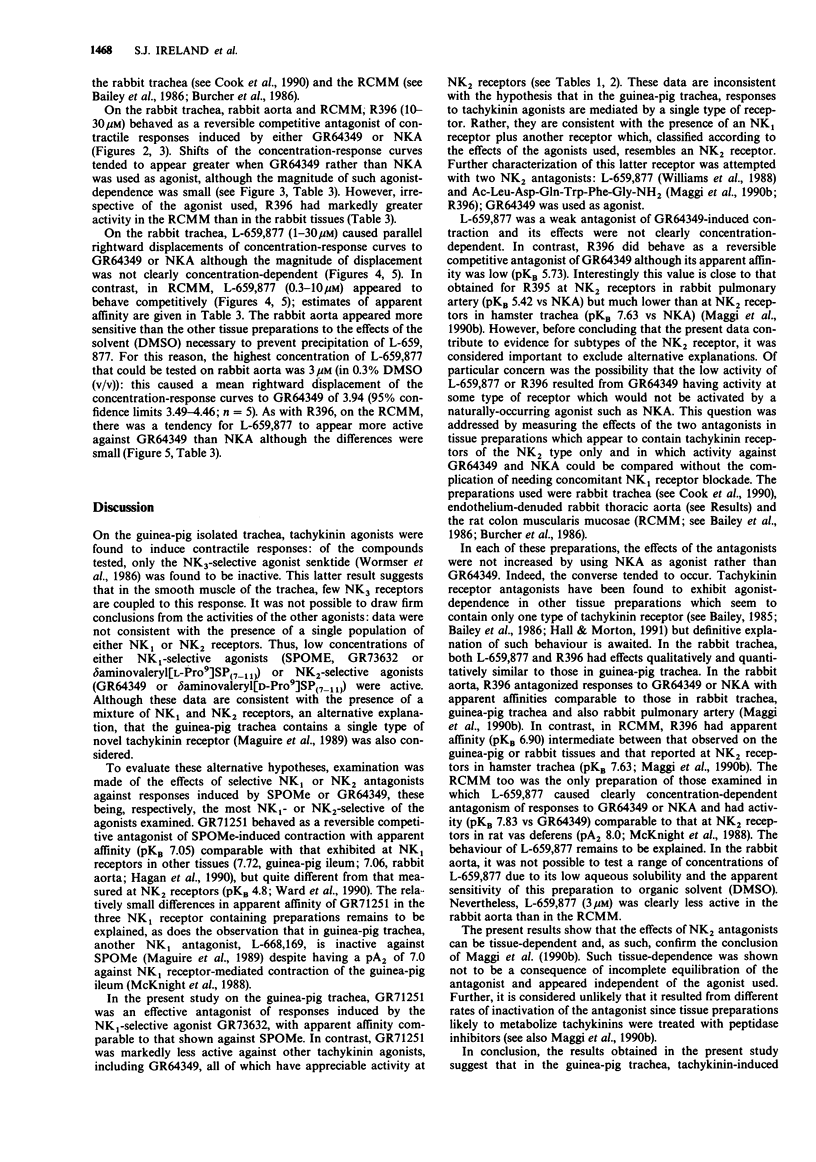
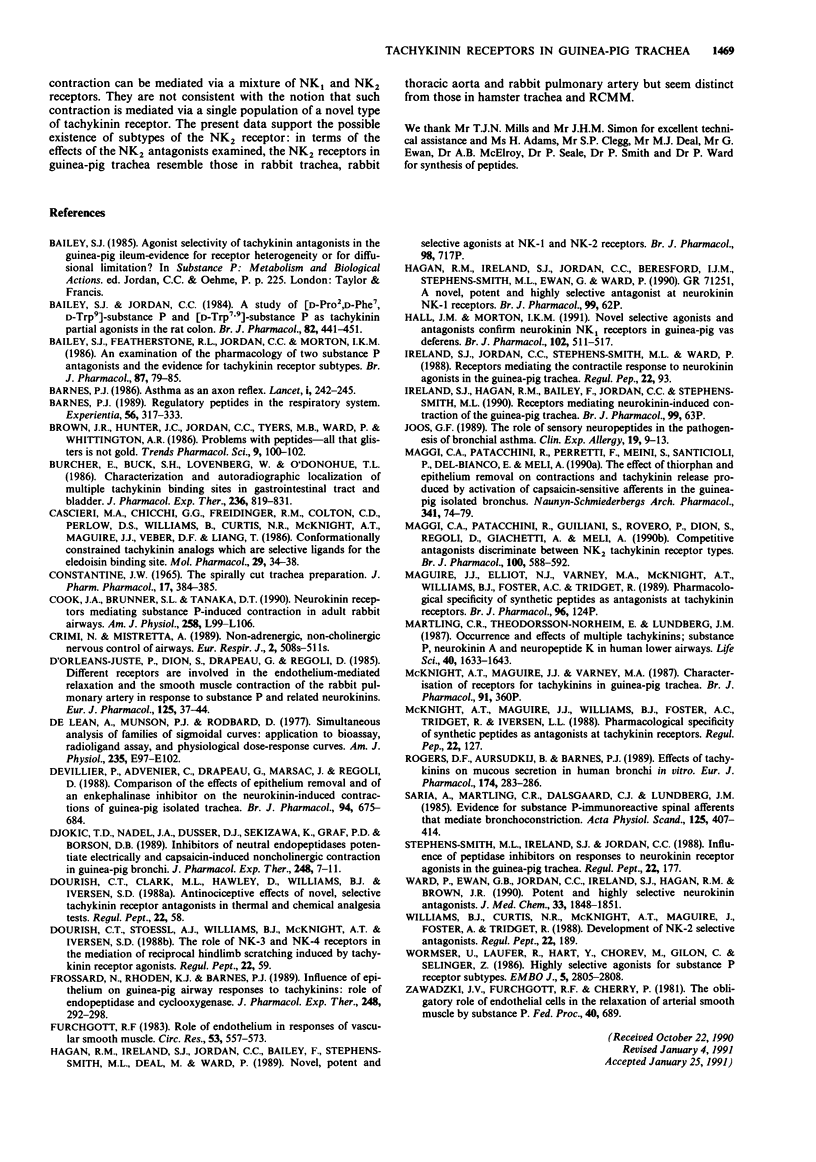
Selected References
These references are in PubMed. This may not be the complete list of references from this article.
- Bailey S. J., Featherstone R. L., Jordan C. C., Morton I. K. An examination of the pharmacology of two substance P antagonists and the evidence for tachykinin receptor subtypes. Br J Pharmacol. 1986 Jan;87(1):79–85. doi: 10.1111/j.1476-5381.1986.tb10159.x. [DOI] [PMC free article] [PubMed] [Google Scholar]
- Bailey S. J., Jordan C. C. A study of [D-Pro2, D-Phe7, D-Trp9]-substance P and [D-Trp7,9]-substance P as tachykinin partial agonists in the rat colon. Br J Pharmacol. 1984 Jun;82(2):441–451. doi: 10.1111/j.1476-5381.1984.tb10779.x. [DOI] [PMC free article] [PubMed] [Google Scholar]
- Barnes P. J. Asthma as an axon reflex. Lancet. 1986 Feb 1;1(8475):242–245. doi: 10.1016/s0140-6736(86)90777-4. [DOI] [PubMed] [Google Scholar]
- Burcher E., Buck S. H., Lovenberg W., O'Donohue T. L. Characterization and autoradiographic localization of multiple tachykinin binding sites in gastrointestinal tract and bladder. J Pharmacol Exp Ther. 1986 Mar;236(3):819–831. [PubMed] [Google Scholar]
- CONSTANTINE J. W. THE SPIRALLY CUT TRACHEAL STRIP PREPARATION. J Pharm Pharmacol. 1965 Jun;17:384–385. doi: 10.1111/j.2042-7158.1965.tb07688.x. [DOI] [PubMed] [Google Scholar]
- Cascieri M. A., Chicchi G. G., Freidinger R. M., Colton C. D., Perlow D. S., Williams B., Curtis N. R., McKnight A. T., Maguire J. J., Veber D. F. Conformationally constrained tachykinin analogs which are selective ligands for the eledoisin binding site. Mol Pharmacol. 1986 Jan;29(1):34–38. [PubMed] [Google Scholar]
- Crimi N., Mistretta A. Non-adrenergic non-cholinergic nervous control of airways. Eur Respir J Suppl. 1989 Jun;6:508s–511s. [PubMed] [Google Scholar]
- D'Orléans-Juste P., Dion S., Drapeau G., Regoli D. Different receptors are involved in the endothelium-mediated relaxation and the smooth muscle contraction of the rabbit pulmonary artery in response to substance P and related neurokinins. Eur J Pharmacol. 1986 Jun 5;125(1):37–44. doi: 10.1016/0014-2999(86)90081-6. [DOI] [PubMed] [Google Scholar]
- DeLean A., Munson P. J., Rodbard D. Simultaneous analysis of families of sigmoidal curves: application to bioassay, radioligand assay, and physiological dose-response curves. Am J Physiol. 1978 Aug;235(2):E97–102. doi: 10.1152/ajpendo.1978.235.2.E97. [DOI] [PubMed] [Google Scholar]
- Demolle D., Boeynaems J. M. Cholera and pertussis toxins amplify prostacyclin synthesis in aortic smooth muscle cells. Br J Pharmacol. 1989 Nov;98(3):717–720. doi: 10.1111/j.1476-5381.1989.tb14597.x. [DOI] [PMC free article] [PubMed] [Google Scholar]
- Devillier P., Advenier C., Drapeau G., Marsac J., Regoli D. Comparison of the effects of epithelium removal and of an enkephalinase inhibitor on the neurokinin-induced contractions of guinea-pig isolated trachea. Br J Pharmacol. 1988 Jul;94(3):675–684. doi: 10.1111/j.1476-5381.1988.tb11575.x. [DOI] [PMC free article] [PubMed] [Google Scholar]
- Djokic T. D., Nadel J. A., Dusser D. J., Sekizawa K., Graf P. D., Borson D. B. Inhibitors of neutral endopeptidase potentiate electrically and capsaicin-induced noncholinergic contraction in guinea pig bronchi. J Pharmacol Exp Ther. 1989 Jan;248(1):7–11. [PubMed] [Google Scholar]
- Frossard N., Rhoden K. J., Barnes P. J. Influence of epithelium on guinea pig airway responses to tachykinins: role of endopeptidase and cyclooxygenase. J Pharmacol Exp Ther. 1989 Jan;248(1):292–298. [PubMed] [Google Scholar]
- Furchgott R. F. Role of endothelium in responses of vascular smooth muscle. Circ Res. 1983 Nov;53(5):557–573. doi: 10.1161/01.res.53.5.557. [DOI] [PubMed] [Google Scholar]
- Hall J. M., Morton I. K. Novel selective agonists and antagonists confirm neurokinin NK1 receptors in guinea-pig vas deferens. Br J Pharmacol. 1991 Feb;102(2):511–517. doi: 10.1111/j.1476-5381.1991.tb12202.x. [DOI] [PMC free article] [PubMed] [Google Scholar]
- Joos G. F. The role of sensory neuropeptides in the pathogenesis of bronchial asthma. Clin Exp Allergy. 1989 Jan;19 (Suppl 1):9–13. [PubMed] [Google Scholar]
- Maggi C. A., Patacchini R., Giuliani S., Rovero P., Dion S., Regoli D., Giachetti A., Meli A. Competitive antagonists discriminate between NK2 tachykinin receptor subtypes. Br J Pharmacol. 1990 Jul;100(3):589–592. doi: 10.1111/j.1476-5381.1990.tb15851.x. [DOI] [PMC free article] [PubMed] [Google Scholar]
- Maggi C. A., Patacchini R., Perretti F., Meini S., Manzini S., Santicioli P., Del Bianco E., Meli A. The effect of thiorphan and epithelium removal on contractions and tachykinin release produced by activation of capsaicin-sensitive afferents in the guinea-pig isolated bronchus. Naunyn Schmiedebergs Arch Pharmacol. 1990 Jan-Feb;341(1-2):74–79. doi: 10.1007/BF00195061. [DOI] [PubMed] [Google Scholar]
- Martling C. R., Theodorsson-Norheim E., Lundberg J. M. Occurrence and effects of multiple tachykinins; substance P, neurokinin A and neuropeptide K in human lower airways. Life Sci. 1987 Apr 20;40(16):1633–1643. doi: 10.1016/0024-3205(87)90130-5. [DOI] [PubMed] [Google Scholar]
- Rogers D. F., Aursudkij B., Barnes P. J. Effects of tachykinins on mucus secretion in human bronchi in vitro. Eur J Pharmacol. 1989 Dec 19;174(2-3):283–286. doi: 10.1016/0014-2999(89)90322-1. [DOI] [PubMed] [Google Scholar]
- Saria A., Martling C. R., Dalsgaard C. J., Lundberg J. M. Evidence for substance P-immunoreactive spinal afferents that mediate bronchoconstriction. Acta Physiol Scand. 1985 Nov;125(3):407–414. doi: 10.1111/j.1748-1716.1985.tb07736.x. [DOI] [PubMed] [Google Scholar]
- Ward P., Ewan G. B., Jordan C. C., Ireland S. J., Hagan R. M., Brown J. R. Potent and highly selective neurokinin antagonists. J Med Chem. 1990 Jul;33(7):1848–1851. doi: 10.1021/jm00169a003. [DOI] [PubMed] [Google Scholar]
- Wormser U., Laufer R., Hart Y., Chorev M., Gilon C., Selinger Z. Highly selective agonists for substance P receptor subtypes. EMBO J. 1986 Nov;5(11):2805–2808. doi: 10.1002/j.1460-2075.1986.tb04571.x. [DOI] [PMC free article] [PubMed] [Google Scholar]



